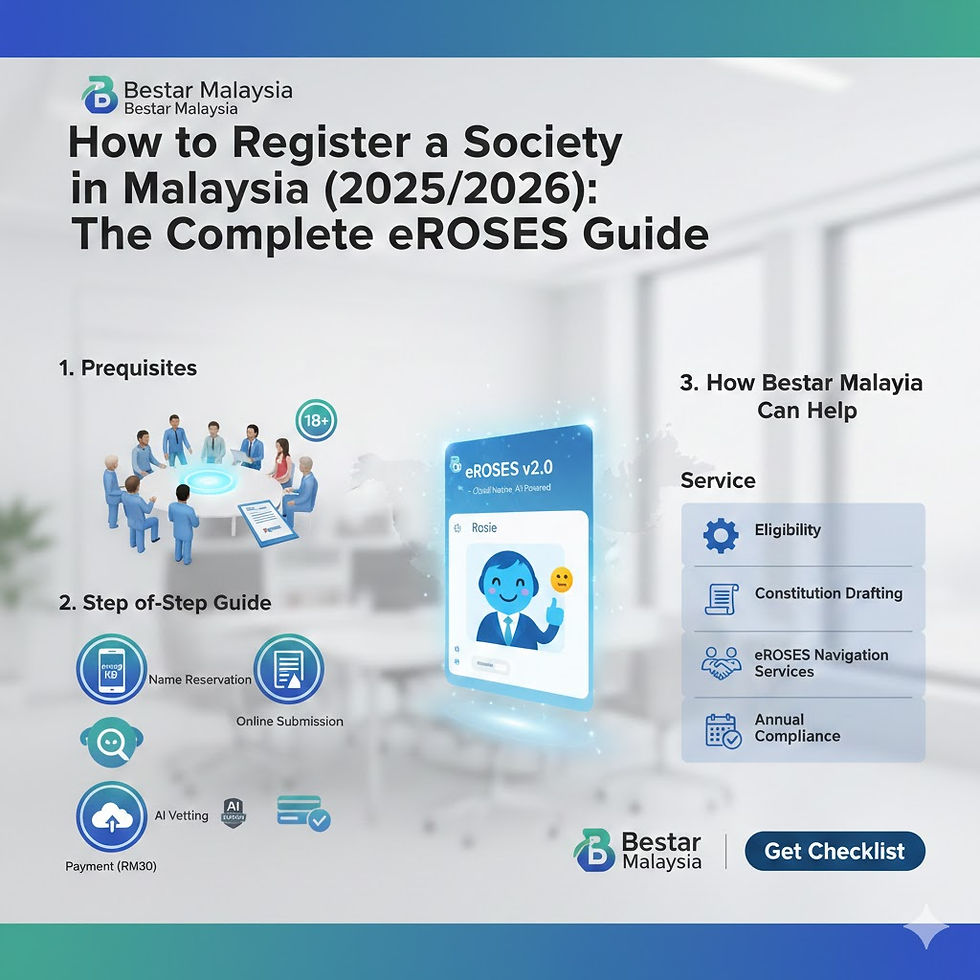Board Remuneration Review in Malaysia
- Roger Pay
- Jun 12, 2025
- 6 min read
Malaysian Board Remuneration Review Overview
Board remuneration review in Malaysia is a critical aspect of corporate governance, driven by regulatory requirements and the need for companies to attract, retain, and motivate high-calibre talent. Here's a breakdown of key considerations and practices:
1. Regulatory Framework and Guiding Principles:
Malaysian Code on Corporate Governance (MCCG): This code, periodically reviewed (most recently in 2021), sets out principles and best practices for good governance, including those related to director and senior management remuneration. While compliance is not mandatory, it serves as a benchmark for companies aspiring to strong governance.
Companies Act 2016 (CA 2016): This Act contains legal requirements regarding directors' fees and benefits. For public companies (listed or not) and subsidiaries of listed companies, directors' fees and benefits must be approved at a general meeting (Section 230(1) CA 2016). For private companies, the board may approve these, but shareholders must be notified within 14 days, and members holding at least 10% voting rights can require a resolution for approval.
Bursa Malaysia Listing Requirements: For public listed companies, these requirements outline specific provisions for remuneration, including disclosures. For example, Paragraph 7.23 of the Main Market Listing Requirements states that executive directors' salaries should not include a commission or percentage of turnover.
2. Key Aspects of Board Remuneration Review:
Remuneration Committee (RC): The MCCG encourages the establishment of a dedicated Remuneration Committee, typically comprising wholly or mainly non-executive directors (with a majority being independent non-executive directors), to oversee remuneration policies and procedures. If combined with the Nomination Committee, it should still ensure dedicated attention to remuneration matters.
Formal and Transparent Procedures: Companies are expected to have a formal and transparent procedure for developing remuneration policies for directors and senior management. These policies should be consistent with the company's culture and aligned with its business and risk strategies, corporate values, and long-term interests.
Components of Remuneration: Remuneration packages typically comprise a balance of fixed and variable components.
Fixed components: Directors' fees, meeting allowances, fixed committee allowances, and benefits-in-kind (e.g., medical coverage, travel allowances). For non-executive directors (NEDs), remuneration usually comprises solely fixed components, without share options.
Variable components: Bonuses, which are designed to reward executive directors and key senior management based on corporate and individual performance.
Fairness and Competitiveness: Remuneration should be sufficient to attract and retain the right talent while being competitive in the marketplace. It should also reflect the demands, complexities, and performance of the company, as well as the skills, experience, and responsibilities required for the role.
Performance Linkage: For executive directors and senior management, remuneration should be structured to link rewards to corporate and individual performance. While NEDs' remuneration is not typically pegged to headline performance indicators, it should consider the company's sustainable performance.
Benchmarking: Periodic benchmarking of remuneration is undertaken to ascertain the competitiveness of packages against other organizations, especially those of similar size and complexity within the same sector. However, this is done with caution to avoid an upward ratchet in remuneration without corresponding performance improvement.
Disclosure and Transparency:
The MCCG strongly encourages detailed disclosure of director and senior management remuneration on a named and individual basis, including a breakdown of components such as fees, salary, bonus, benefits-in-kind, and other emoluments.
For the top five senior management, disclosure in bands of RM50,000 is encouraged.
Greater transparency aims to allow shareholders to make informed decisions when approving remuneration and for stakeholders to understand the link between remuneration and company performance.
Shareholder Approval: For public companies, directors' fees and benefits are subject to annual approval by shareholders at the Annual General Meeting (AGM). This facilitates informed decision-making by shareholders.
Review Frequency: Remuneration policies and procedures are reviewed periodically (e.g., annually or at least every three years for NEDs) by the Remuneration Committee or the Board as a whole, often with the assistance of independent external consultants to ensure a holistic and independent review.
Challenges and Areas for Improvement:
Transparency: Historically, Malaysian corporates have been somewhat reserved in disclosing remuneration packages, particularly for senior management. While the MCCG encourages detailed disclosures, adoption rates can vary.
Benchmarking and Affordability: Some companies may face challenges in proper benchmarking and affordability when determining remuneration, especially for independent non-executive directors, leading to potential shortfalls in compensation relative to responsibilities.
Fragmentation of Information: There has been an issue of fragmented information related to remuneration practices, highlighting the need for greater consistency and standardization in reporting.
Overall, board remuneration review in Malaysia is an evolving area, with continuous efforts to enhance corporate governance standards, promote transparency, and ensure fair and performance-linked compensation for directors and senior management.
How Bestar can Help
Engaging professionals for board remuneration review in Malaysia can bring significant value to companies, ensuring that remuneration practices are fair, competitive, compliant, and aligned with strategic objectives. Here's how Bestar can help:
Market Benchmarking and Data Analysis:
Access to Proprietary Data: Bestar has extensive databases of remuneration data across various industries, company sizes, and roles in Malaysia and the region. This allows for accurate benchmarking against peers.
Tailored Analysis: We don't just provide raw data; we analyze it to provide insights relevant to the company's specific context, considering factors like industry, revenue, market capitalization, employee count, and complexity of operations.
Remuneration Policy Design and Review:
Expert Guidance: We help design or refine remuneration policies that are aligned with the company's business strategy, risk appetite, and corporate values. This includes determining the right mix of fixed and variable pay, long-term incentives, and benefits.
Performance Metrics: We assist in identifying and implementing appropriate performance metrics (financial and non-financial) for executive directors and senior management, ensuring a strong link between pay and performance.
Regulatory Compliance:
MCCG and Bursa Malaysia Requirements: We ensure that the remuneration framework complies with the latest Malaysian Code on Corporate Governance (MCCG), Bursa Malaysia Listing Requirements, and the Companies Act 2016. This is crucial for avoiding regulatory penalties and maintaining good governance.
Disclosure Best Practices: We advise on best practices for remuneration disclosures in annual reports and corporate governance reports, enhancing transparency and investor confidence.
Shareholder Relations and Communication:
Shareholder Engagement: We can help formulate a compelling narrative around the remuneration philosophy and outcomes, which is vital for gaining shareholder approval, especially for listed companies.
Proxy Advisor Insights: We are aware of the perspectives and recommendations of proxy advisory firms, helping companies anticipate and address potential concerns.
Independent Advice and Objectivity:
Minimising Bias: By providing an independent perspective, Bestar helps the Remuneration Committee and Board make objective decisions, free from internal biases or personal interests.
Strengthening Governance: Our involvement enhances the credibility and robustness of the remuneration review process, demonstrating a commitment to good corporate governance.
Non-Executive Director (NED) Remuneration:
We provide specific insights into appropriate fees and allowances for NEDs, ensuring that compensation is fair, reflects their responsibilities, and does not compromise their independence.
Bestar offers a broad perspective on overall governance structures, including how remuneration fits into the larger picture. We can help with:
Board Effectiveness Reviews: Assessing the overall effectiveness of the board and its committees (including the Remuneration Committee) and identifying areas for improvement that might impact remuneration decisions.
Governance Framework Development: Helping establish or refine the entire corporate governance framework, ensuring that all policies and procedures, including remuneration, are integrated and coherent.
Risk Management Linkages: Ensuring that remuneration practices adequately consider and mitigate risks, especially in financial institutions where incentive structures can have significant risk implications.
Bestar plays a crucial role in ensuring the legal compliance of remuneration practices:
Statutory Compliance: Advising on the legal requirements of the Companies Act 2016 regarding directors' fees and benefits, particularly the need for shareholder approval.
Contractual Agreements: Drafting and reviewing employment contracts for executive directors and senior management to ensure that remuneration terms are legally sound and enforceable.
Tax implications of remuneration packages can be complex. Bestar can help by:
Optimising Tax Efficiency: Advising on tax-efficient ways to structure remuneration packages for both the company and the individual.
Compliance with Tax Laws: Ensuring that all remuneration components are compliant with Malaysian tax laws and regulations.
When to engage professional help:
Companies typically engage Bestar for board remuneration review in Malaysia when:
Undergoing a significant strategy change: Remuneration needs to align with new strategic directions.
Preparing for IPO or M&A: Ensuring robust and transparent remuneration practices for public scrutiny.
Experiencing high executive turnover: Reviewing if remuneration is competitive enough to attract and retain talent.
Facing shareholder scrutiny: Addressing concerns from investors regarding executive pay.
Responding to new regulatory requirements: Ensuring compliance with updated governance codes.
Conducting regular, periodic reviews: To maintain best practices and market competitiveness.
By leveraging the expertise of Bestar, Malaysian companies can establish remuneration frameworks that are not only compliant and competitive but also truly drive performance and contribute to long-term sustainable growth.




Comments